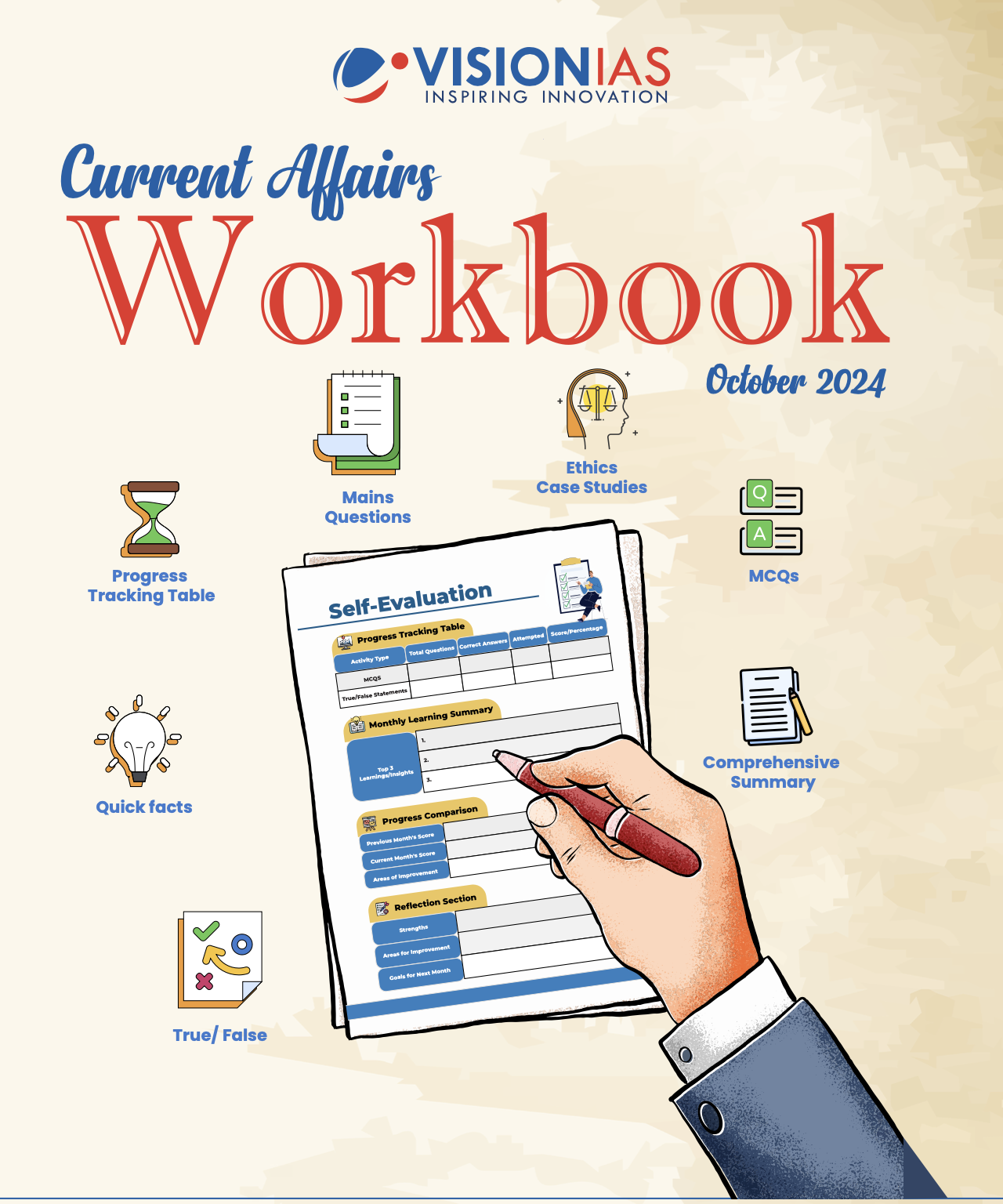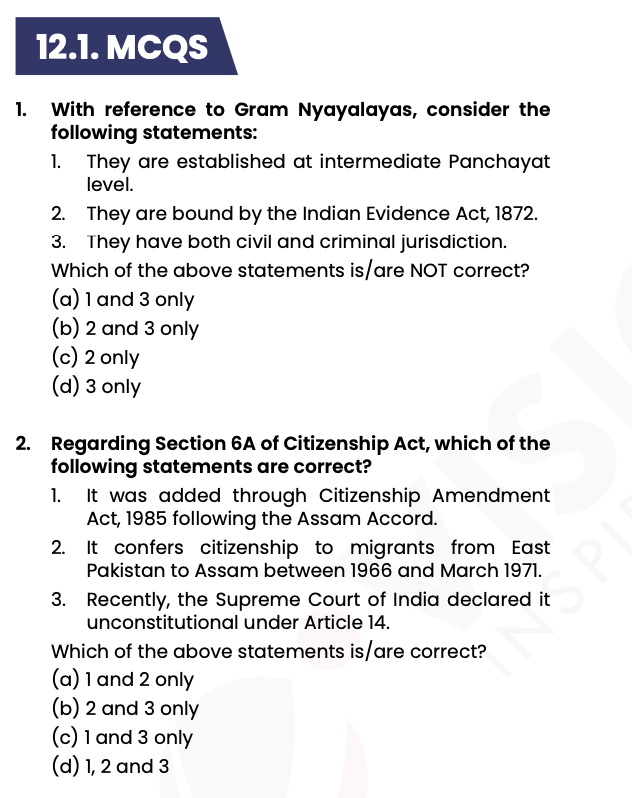Current affairs lies at the heart of UPSC Civil Services Examination preparation, influencing all three stages—Prelims, Mains, and the Personality Test. Mastering current affairs demands more than just passive reading—it requires active engagement and consistent practice. Considering this, we present the Current Affairs Workbook, a comprehensive tool designed to make your revision journey structured, interactive, and results oriented.
In this comprehensive blog, we’ll explore the workbook’s relevance, structure, how to use it effectively, and its synergy with VisionIAS’s Monthly Current Affairs Magazine.

1. VisionIAS Current Affairs Workbook: A Quick Overview
The Current Affairs Workbook integrates knowledge with practice, reflection, and self-evaluation. It emphasizes active engagement, allowing aspirants to not only learn but also apply their understanding.
- Key Features:
- Summary of the Monthly Magazine: A concise overview of the month's major insights, key events, and trends. This section lays the foundation for understanding before delving into activities.
- Quick Facts Block: A ready reference of essential facts, figures, and statistics— ideal for rapid revision and recall.
- Activities Block :
-MCQʼs: Test comprehension of significant topics.
-True/False Statements: Verify your understanding of key facts.
-Mains practice Questions: Explore and articulate in-depth topics with clarity.
-Ethics Case Studies: Apply current events to ethical dilemmas, refining decision making skills.
-Answers and Explanation: Includes answers to MCQs and True/False questions for immediate
-feedback.
- Progress tracking table: Monitor your progress with a dedicated section to record scores and reflect on areas for improvement.
2. Relevance for UPSC Civil Services Examination
The workbook’s format and content align seamlessly with the requirements of all three stages of the UPSC exam.
2.1 Prelims Preparation
Prelims require a grasp of facts and conceptual clarity. The workbook provides MCQs on relevant topics. For example, questions on Gram Nyayalayas not only test knowledge but also provide explanations to enhance understanding.

Features sections like News in Shorts, summarizes essential updates which are crucial for prelims.

2.2 Mains Examination
Mains demand a deeper analysis and the ability to articulate nuanced viewpoints. The workbook caters to this need through:
- Mains-Oriented Questions: For instance, the section on Digital Health not only provides key facts but also addresses issues like accessibility, challenges in implementation, and possible solutions, forming a perfect base for GS-II and GS-III answers.

- Ethics Case Studies: Topics like AI and Defense offer ethical dilemmas that test decision-making and analytical skills, essential for GS-IV.

- Quick revision: through summaries and Quick facts section.

2.3 Personality Test (Interview)
For the interview, candidates need to connect current affairs to real-world applications. The workbook prepares aspirants through:
- Analysis of bilateral relations, such as the India-Maldives Relationship, detailing strategic, economic, and cultural ties.
- Discussions on issues, like the India-Canada Relationship, offering a balanced perspective on diplomatic fallout and its impact on diaspora and trade.
3. How to Use the Workbook Effectively?
The Current Affairs Workbook is a dynamic resource, but its effectiveness depends on how it’s utilized.
- Read: The workbook gains maximum efficacy when paired with the Monthly Current Affairs Magazine. The magazine provides in-depth content, while the workbook ensures retention and application. Start with the monthly current affairs magazine for a foundational understanding.
- Practice: Engage with the workbook through activities like solving MCQs to test factual recall and attempting Mains Practice Questions to improve answer writing. For instance, questions on Make in India challenge aspirants to critically evaluate its successes and failures.
- Evaluate: Self-assess your progress and track improvements over time through progress tracking tables.
4. Supplementing the Workbook with VisionIAS Monthly Current Affairs Magazine: Bridging the Gap
The magazine’s detailed analysis lays the foundation, while the workbook reinforces learning through practice. Together, these resources cover every aspect of current affairs. For instance, the magazine explains geopolitical developments like the India-China Border Dispute, while the workbook includes practice questions for clarity and retention.
Practice with the workbook also improves memory and conceptual clarity. For example, revising Hyperlocal Weather Forecasting through both resources ensures you’re prepared for GS-III and interview discussions.
5. Conclusion: Your Path to UPSC Success
The VisionIAS Current Affairs Workbook is not just a resource; it’s a guide, coach, and evaluator rolled into one. It complements the Monthly Current Affairs Magazine, offering a 360-degree approach to mastering current affairs for UPSC CSE. Whether you’re aiming to ace Prelims, write impactful Mains answers, or impress the interview board, this workbook equips you with the knowledge, skills, and confidence to succeed.
Key Takeaway: Make the workbook your companion, practice diligently, and let its structured approach lead you to your UPSC dreams.
As Bruce Lee said, “I fear not the man who has practiced 10,000 kicks once, but I fear the man who has practiced one kick 10,000 times.” Dedicate yourself to consistent practice, and success will follow.